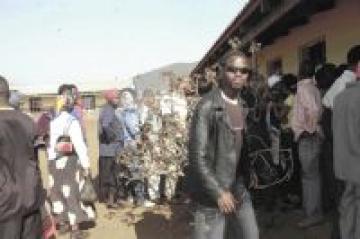Tinkhundla needs opposition to become fully democratic

Could one imagine a country without the media, dissenting voices and a high level of nepotism, yet ranked very high in good governance and sustainable development? This would be like a football team being told that there will be no opposing team but some players should on their own decide to play as the opponent.
The opponent is not decided inside the football pitch but outside, sometimes days before the match. This scenario shows how Parliament in the Tinkhundla system of governance is expected to operate; an unorthodox way of Parliament operation in a civilised society.
By the same token, the opposition in Parliament does not and should not mushroom from the current Parliament but be decided by the electorate at the ballot paper. Maybe, it must be noted that vocal MPs are not necessarily the opposition because they do not have any mandate to carry out that task.
They maybe so to their runners at the Inkhundla level. These are the same problems where trade unions find themselves talking on governance issues in a political tone because of the absence of an opposition. They serve under the government and at the same time play the role of the opposition, rendering an unhealthy political operations.
The Tinkhundla system is now confronted by these; the dissenting political views which can be uttered anywhere, forcing the regime to plant informers all over the show, thus being thinly spread to work on genuine issues. Therefore, the unofficial opposition in Parliament to government might mean that the Inkhundla is in fact, opposing the Tinkhundla government, thus confusing the electorate.
By the way, how many Tinkhundla have had an opportunity where the MP has sought the advice of the Inkhundla before moving a motion in Parliament, debating Bills including the Appropriation Financial Bill and other reports affecting the entire nation? Some Tinkhundla have never seen a gazette and or any government documentation because there is no library in the Inkhundla Centre.
There are certain issues in the Tinkhundla operations that are remotely controlled because the system is not people driven. The 2008 general elections reports have not been issued, where in democratic countries such details are issued just after the results. Besides, the media is aware of the no go-areas of certain information or simply apply the self-censorship approach.
Yet, there are those who believe the Tinkhundla political system, especially Parliament performs better than some multi party parliaments, without noticing that the level of Parliament role maybe lacking even in a multi party system. In other words, the route to Parliament may not be the ballot paper, and in no way should this justify the Tinkhundla way of doing things.
Whether a country is democratic or undemocratic, the MPs must understand the role of Parliament and the principles of freedom of association as enshrined in the Constitution. The Swaziland Constitution has the Bill of Rights with all the freedoms including that of association, but then, why block multi party freedom?
Parliament as an institution is governed by the Commonwealth principles and may have a window to influence any local controlled Parliament, depending on the quality of the MPs. MPs are exposed in numerous fora and to reputable individuals/politicians from other nations. These fora are the Commonwealth Parliamentary Association, the Southern African Development Community Forum, etc where MPs should expose the undemocratic-ness of the Tinkhundla regime.
Change can only be possible when the quality of MPs is enhanced with agents who want to perform their duties for the sake of others, thus putting their selfish needs aside. Who has all these attributes? Your guess is as good as mine. The power is in your hands, so goes the saying from reputable heroes of this century. However, let us look at those items that strengthen democracy, to get a sense of involving ourselves in the development of sustainable democratic principles.
There are five activities that must occur or happen around democracy with constant monitoring and evaluation of democracy; organising democracy, preventing democratic erosion, preventing democratic breakdown, completing democracy and deepening democracy based on the classification. Authoritarian is a negative approach to democracy, unfortunately it is where we start and advance democracy a positive one where we all want to be.
Democracy begins from liberal people who want to see people enjoying their democratic rights and that these people must elect their representatives to lead/govern them. There are those who believe that all those who want a democratic Swaziland are gunning for political positions, a notion farther from the truth. It should be democracy first before campaigning, to allow those willing to market their manifestos to emerge.
Both democratic breakdown and erosion pose a threat when liberal democracy has been contaminated with corruption, elections rigging and dictatorial tendencies. Completing democracy refers to a situation where the electoral process is error free, transparent and guaranteeing free, fair and credible elections. Deepening democracy gives guarantees that the electoral is accepted and that the contesting candidates and supporters are willing to accept the outcome of the results without any further delay, suggesting the maturity of democracy.
Democracy is never strengthened by armed forces but by democratic institutions and the rule of law. Where can my dear reader place the Tinkhundla regime?




 del.icio.us
del.icio.us Digg
Digg